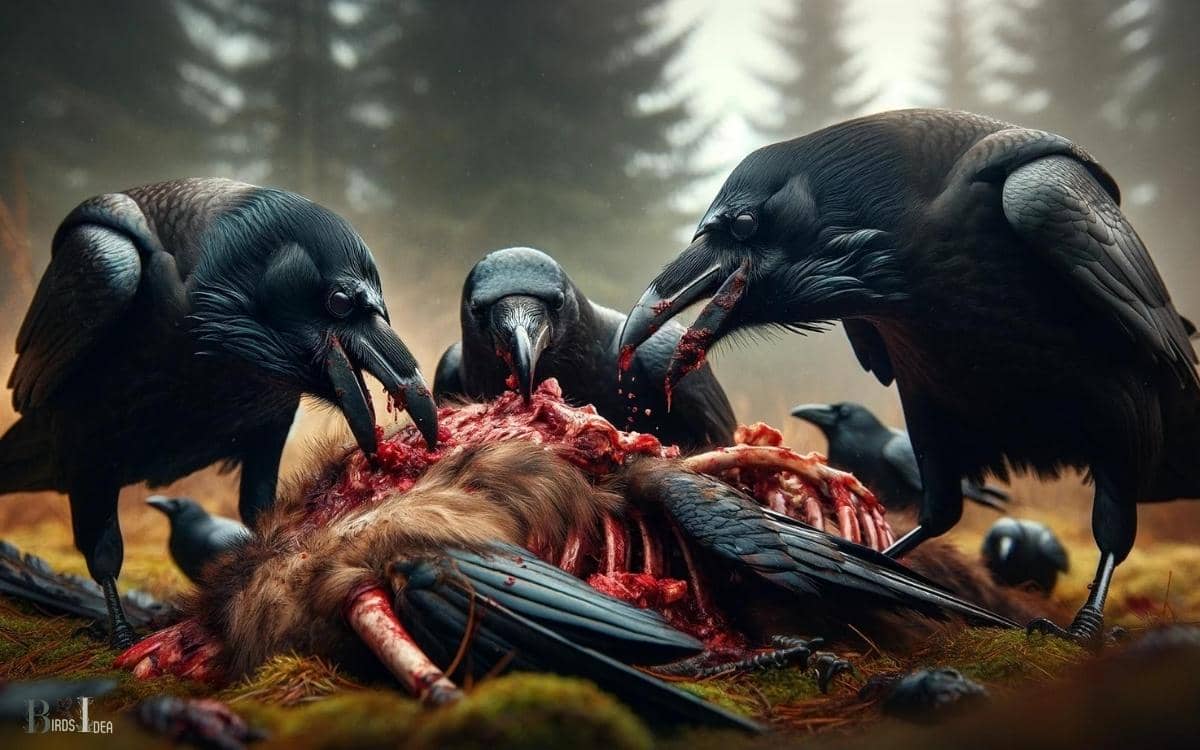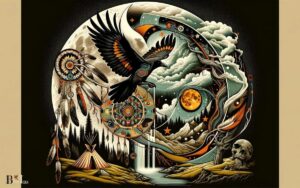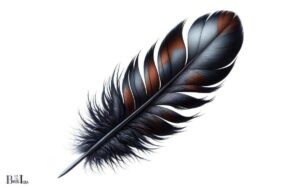What Do Carrion Crows Eat?! Carrion, Small Mammals!
Carrion crows are omnivorous birds that primarily feed on carrion, small mammals, invertebrates, cereal grains, fruits, and occasionally human food waste.
Their ability to consume a wide range of foodstuffs makes them highly adaptable to various habitats.
Carrion crows have a varied diet that includes:
- Carrion: They eat the flesh of dead animals, which is a significant part of their diet.
- Small mammals: Such as mice and voles are hunted.
- Invertebrates: Including insects, worms, and larvae.
- Plants: They consume cereal grains, seeds, and fruits.
- Human waste: They are known to scavenge food from garbage bins or leftovers.
For example, a carrion crow might be seen picking at roadkill, rummaging through compost, or hunting for insects in a field.
As opportunistic feeders, carrion crows play a crucial role in the ecosystem by cleaning up carrion and controlling pest populations.

Key Takeaway
Natural Diet of Carrion Crows
The natural diet of Carrion Crows primarily consists of various small vertebrates, insects, fruits, and carrion.
These highly adaptable birds are opportunistic feeders, preying on small mammals, amphibians, reptiles, and the eggs and nestlings of other birds.
Their diet also includes a wide range of invertebrates such as earthworms, snails, and insects.
Carrion Crows consume a variety of fruits, berries, and seeds, especially during the non-breeding season when these food sources are more abundant.
They are also known for scavenging on carrion, displaying their omnivorous nature by feeding on animal carcasses.
This diverse diet allows Carrion Crows to thrive in varied habitats, from urban areas to agricultural lands, demonstrating their ability to find food resources in environments where they have the freedom to roam and forage.
Carrion Crows as Scavengers
Carrion Crows are known for their role as scavengers, feeding on a wide range of carrion and animal carcasses to supplement their diet.
Their scavenging behavior allows them to capitalize on available food resources, contributing to their adaptability and ecological success.
Carrion Crows demonstrate remarkable opportunism, often congregating around carcasses of various animals, including small mammals, birds, and fish.
Their scavenging habits also extend to human-made environments, where they scavenge on discarded food scraps and waste.
This scavenging behavior not only aids in the maintenance of ecosystem health by facilitating the removal of carrion but also highlights the adaptive nature of Carrion Crows in utilizing diverse food sources.
Their ability to thrive as scavengers showcases their significance in ecological processes and their capacity to exploit various food opportunities.
Carrion Crows’ Carnivorous Tendencies
Demonstrating carnivorous tendencies, Carrion Crows consume a diverse array of animal matter to meet their dietary needs.
Their diet primarily consists of:
- Insects: Carrion Crows are adept at catching insects such as beetles, caterpillars, and grasshoppers. They use their sharp beaks and agile movements to capture these small prey items.
- Small mammals: They opportunistically hunt small mammals like mice and voles, displaying remarkable stalking and pouncing abilities.
- Amphibians and reptiles: Carrion Crows have been observed preying on frogs, lizards, and even small snakes, showcasing their adaptability and resourcefulness in obtaining food.
These carnivorous behaviors highlight the Carrion Crow’s role as a versatile predator in various ecosystems, demonstrating their ability to thrive in diverse environments.
Carrion Crows’ Omnivorous Behavior
Exhibiting a diverse diet, Carrion Crows also incorporate a variety of plant matter and non-animal food sources into their omnivorous feeding habits.
In addition to their scavenging and carnivorous tendencies, Carrion Crows consume a range of fruits, seeds, grains, and human food sources.
The following table outlines some of the non-animal food sources commonly consumed by Carrion Crows:
| Food Source | Description | Importance |
|---|---|---|
| Fruits | Including berries, apples, and pears | Provides essential vitamins and antioxidants, aids in seed dispersal |
| Seeds | Such as sunflower seeds and grains | Rich in carbohydrates and fats, crucial for energy and nutrition |
| Human food waste | Leftover food from human settlements and garbage | Supplements diet, provides access to diverse nutrients and food types |
This diverse consumption pattern showcases the adaptability and opportunistic feeding behavior of Carrion Crows. Transitioning into the subsequent section, it is crucial to explore the implications of human food sources for Carrion Crows.
Human Food Sources for Carrion Crows
Human food sources can significantly influence the dietary habits of Carrion Crows. These highly adaptable birds have readily incorporated human food into their diet, leading to changes in their foraging behavior and food preferences.
The following illustrates the impact of human food sources on Carrion Crows’ dietary habits:
Urban scavenging
Carrion Crows scavenge in urban areas, feeding on discarded human food such as leftovers, fast food remnants, and food waste from outdoor dining areas.
This behavior has led to a shift towards a more varied diet, including processed foods and human leftovers.
It has also increased their presence in urban environments, where they exploit human food sources.
Food from agricultural activities
Carrion Crows feed on food scraps from agricultural activities, such as crop leftovers and spilled animal feed.
This has led to changes in their foraging patterns and increased their association with agricultural landscapes.
It has also impacted their feeding dynamics, as they exploit human food sources in agricultural settings.
Conclusion
Carrion crows are highly adaptable birds with a varied diet. Their natural diet includes insects, small mammals, fruits, and seeds. As scavengers, they also feed on carrion and refuse.
Their carnivorous tendencies are evident in their consumption of small vertebrates and other birds’ eggs. Carrion crows exhibit omnivorous behavior, consuming human food sources when available.
Overall, their diverse dietary habits contribute to their impressive survival skills in various environments.





